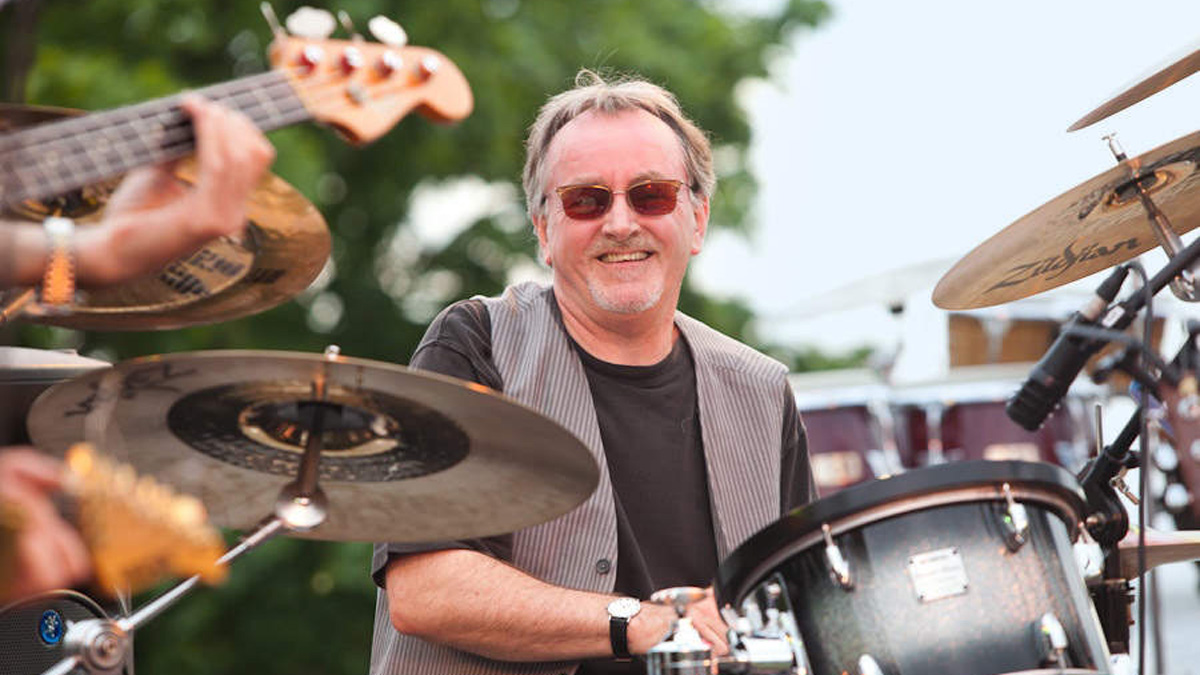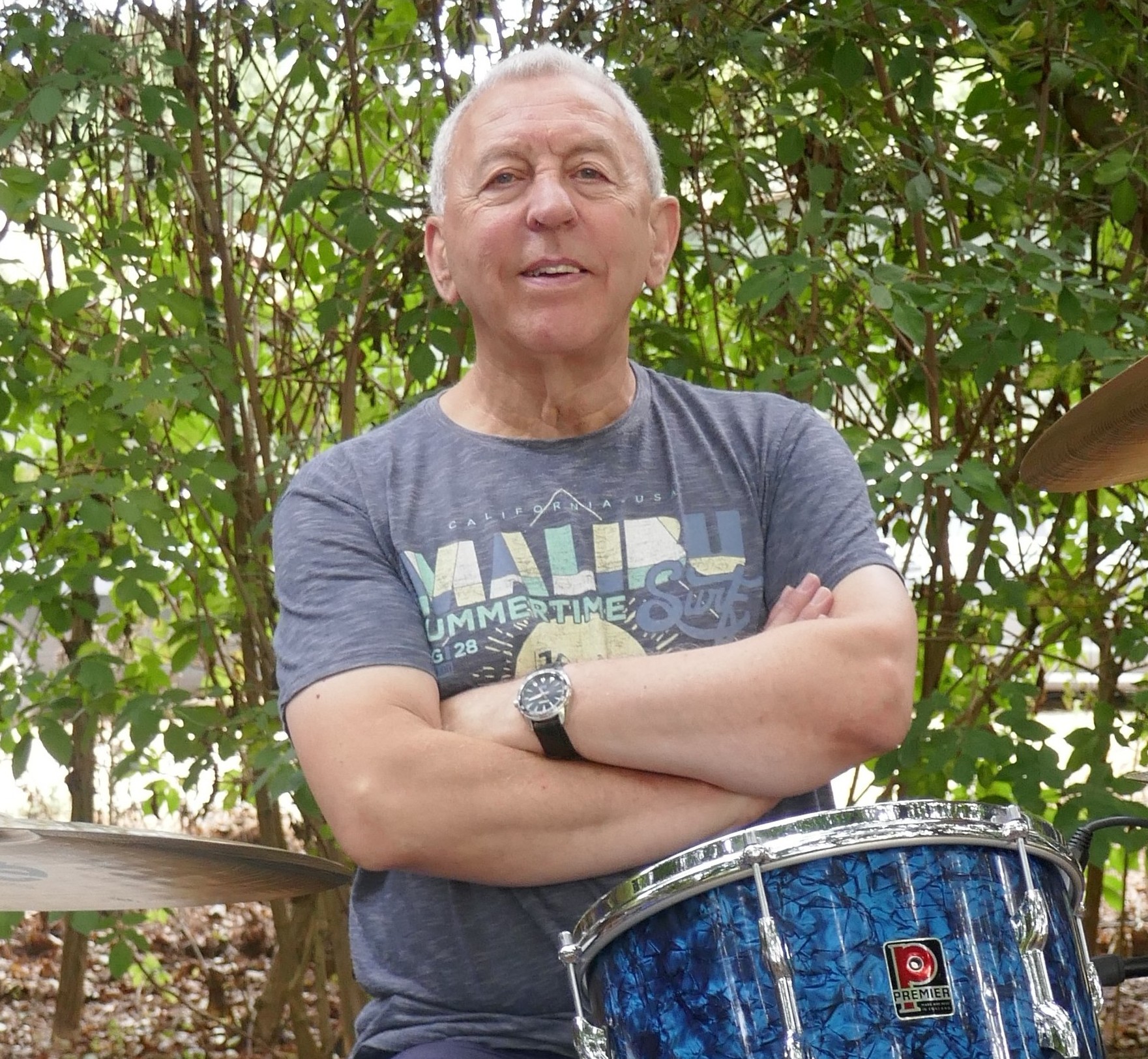Behind the drums - Dave Mattacks: “By contemporary standards, I’ve no technique to speak of"
Too-modest session ace takes on our must-know questions

Before leaving the UK for New England back in 2000, Dave Mattacks was one of the UK’s top session drummers, known for his musically sensitive way with backing up a plethora of singer-songwriters from Joan Armatrading to Richard Thompson and Paul McCartney.
Dave is back in the UK for his annual spring jaunt with Feast Of Fiddles. Fronted by six top fiddlers, it’s the collective’s 25th annual UK tour, as they roam from traditional folk through contemporary folk-rock with the odd curveball thrown in. A swing arrangement of a film score perhaps, or a sly segue into Led Zeppelin’s Kashmir.
Although atypical, the latter is the perfect vehicle for DM’s economic, strong and fastidious drumming - his unlikely old 1970s mate Bonzo would certainly approve. Mattacks’ folk connection traces back to his breakthrough with UK folk-rock masters Fairport Convention in 1969.
From this platform he built a wide-ranging session career, culminating in appearances on five Paul McCartney albums. His CV lists hundreds of albums and artists including George Harrison, Elton John, Nick Drake, XTC, Jimmy Page, Brian Eno, Mary Chapin Carpenter, Rosanne Cash, John Martyn and Jethro Tull.
As the session world diminished in the UK he found himself drawn to the north-eastern USA. Thus from 2000 he has carved out a new scene in the Boston area where he’s still very much active with live and recording work. His special talent for making singer-songwriters comfortable owes to his multi-faceted ability to play piano and bass, and with a huge thirst for furthering his musical and drumming knowledge, he also now produces and arranges.
DM, what was the first kit that you ever owned?
“I started with just a snare drum - a truly awful Gigster - and added to it when I could afford to. A whole set, predominately Premier, gradually emerged. I distinctly remember when I graduated to my Ludwig 400: ‘Ahh! That’s what a snare drum is supposed to sound like!’”
Want all the hottest music and gear news, reviews, deals, features and more, direct to your inbox? Sign up here.
Did you take lessons or were you self-taught?
“I had some lessons early on from Johnny Joseph, a Southend-based drummer who was playing in the London ballrooms. He got me started with the basics of reading and showed me various rhythms, such as the foxtrot, rhumba, etc. It was all very helpful.
“Around the same time, Johnnie Richardson, who was my boss/manager when I apprenticed at London’s Drum City, taught me so much about music and the instrument. I had a lesson a few years ago with Dave Hassell - a humbling experience, I can assure you!”
Who did you look up to as a young drummer?
“Initially it was the original Shadows’ drummer Tony Meehan, then Kenny Clare, who was a big influence. Kenny’s approach, and especially his sound, really had a big effect on me. Getting to meet and subsequently know him later on was a big thing for me. ‘Discovering’ him was followed rapidly by learning about and hearing Buddy, Ringo and all the other great jazz and rock drummers from that era.”
I’m much more tuned-in to the shape and harmonic construction of the piece I’m playing - what the players are ‘saying’
What was the first song that you learned to play?
“Elvis Presley’s Her Latest Flame. I did a great job on a pair of bongos with my mum’s knitting needles. By the time the almost-complete kit was in place, being able to play Shadows tunes was a real badge of maturity.”
How did you develop your drum sound?
“By both listening and playing a lot, trying to understand the instrument. It’s still very much a work in progress. I used to think of the recording studio versus live as the big differences when trying to get a sound. I’ve since learned that acoustics, tuning, touch, the type of music and the musical line-up - from a trio to a big band - are the more pertinent factors. Having a handle on different genres has its advantages too.”
What is the key to your playing style?
“It’s difficult not to be subjective, but I’d say economy and, hopefully, doing something musically appropriate. However, every musician feels that way about their playing, certainly regarding the latter.”
What has been your biggest career highlight?
“In terms of people I’ve been fortunate to work with, that’s reasonably well documented, but getting to play Ronnie Scott’s Club for the first time - in the mid-1990s I believe - with Liane Carroll was definitely a high point.
“Although I’ve been lucky to work alongside some wonderful people over the years, my live work with Richard Thompson - with various line-ups – has always held a particularly special place in my heart.”
What do you think is the key to longevity as a musician?
“A love of music and a desire to make it selflessly with like-minded people. It’s a real cliché, but I’m simply trying to make the singer, the band and the music sound good.”
What is the best advice that you have ever been given?
“Stop trying to ‘play’ everybody else’s instrument. That came from Johnnie Richardson. In other words, just because you can ‘hear’ what they’re playing, you don’t have to always pass it back to them. There’s a fine line between too little and too much interaction in all musical genres.”
What is your biggest strength as a drummer?
“Again, it’s hard to be objective, but I do have a fairly good harmonic knowledge. The piano came before the drums, by the way. You know, as much as I love them, when I start playing, the actual drums are the last thing on my mind. I’m much more tuned-in to the shape and harmonic construction of the piece I’m playing - the lyrics, the feel, what the players are ‘saying’, etc. I’m certainly not thinking licks! Again, nothing particularly new here, I know I’m not alone in this attitude.”
And your biggest weakness?
“By contemporary standards, I’ve no technique to speak of. I’m also working on improving my time and getting more ‘grease’ into my playing.”
Who would you most like to take a drum lesson from?
“When he was with us, I would have loved to have spent some time with Paul Motian. I have to add that hearing a favourite musician ‘in-the-flesh’ and in situ with a band is always truly illuminating.”
Dampen the kit or let it ring?
“Big cymbals or small ones? Matched or traditional grip? Whatever works… For quite some time, the ‘this is my sound, so deal with it’ approach feels like selfishness to me. If I have to damp-down, or liven-up my drums or cymbals so they fit the music better, so be it.”
What is the one piece of gear you couldn’t live without?
“A drum stool. I should add that I’m also very happy with the way the multi-rods and brushes thing has grown over the last 20-plus years. There are now so many more sonic options at our disposal.”
Who do you see as an underrated drummer?
“That could easily be a very long list, but depending upon who you talk to, Jack Bruno, Joey Baron and Jim Oblon spring to mind.”

Geoff Nicholls is a musician, journalist, author and lecturer based in London. He co-wrote, co-presented and played drums on both series of ‘Rockschool’ for BBC2 in the 1980s. Before that he was a member of original bands signed by Decca, RCA, EMI and more. ‘Rockschool’ led to a parallel career writing articles for many publications, from the Guardian to Mojo, but most notably Rhythm magazine, for which he was the longest serving and most diverse contributor.